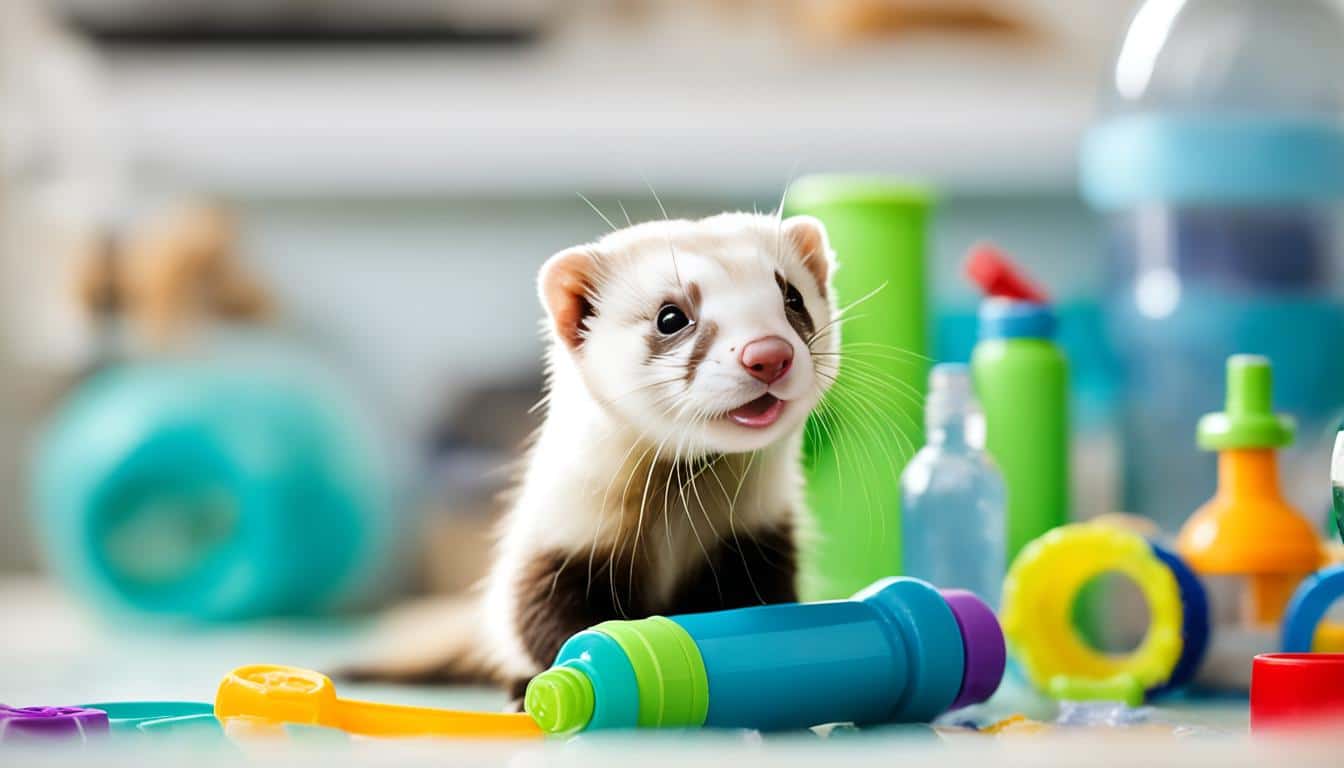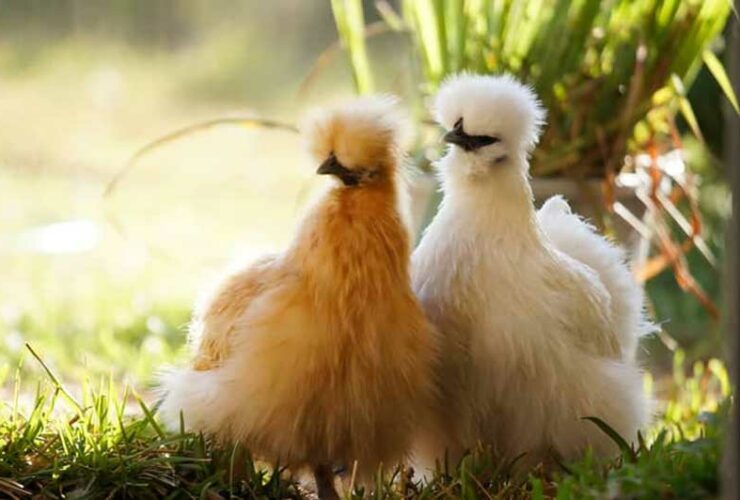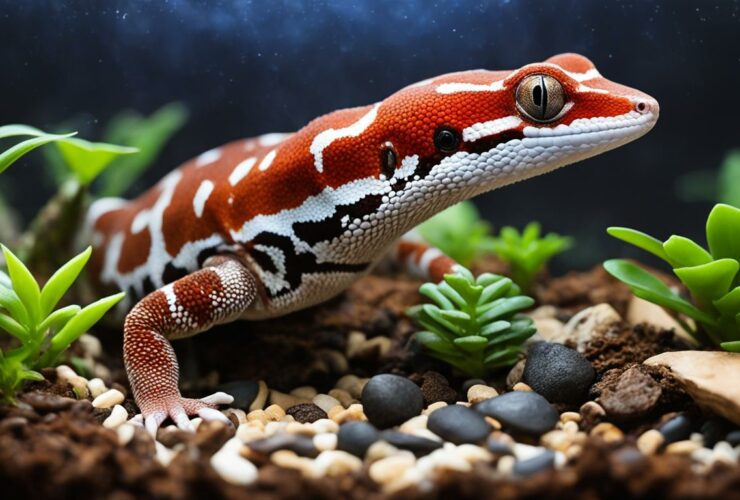Welcome to our comprehensive guide on ferret care! Whether you’re a new ferret owner or have been caring for these adorable animals for years, this article will provide you with essential tips and insights to ensure your furry friends thrive. From understanding their behavior and habitat needs to tailoring their diet for optimal health, we’ve got you covered.
As responsible pet owners, it’s crucial to provide the best care possible for our ferret companions. By following these tips, you’ll be able to create a nurturing environment that meets their physical and emotional needs, promoting their overall well-being.
Are you ready to dive into the world of ferret care? Let’s get started!
Key Takeaways:
- Understanding — and catering to — your ferret’s behavior and traits is essential for their happiness and well-being.
- Creating a suitable habitat for your ferret involves selecting the right cage, providing enrichment activities, and ensuring their comfort.
- A balanced and nutritional diet is crucial for your ferret’s health and longevity. Learn about their specific dietary requirements.
- Ferrets have various species, each with its own unique characteristics and fascinating facts. Discover more about these amazing creatures.
- By following these essential tips, you’ll be well-equipped to provide a healthy and fulfilling life for your beloved ferret.
Understanding Ferret Behavior and Traits
Ferrets are fascinating creatures with unique behaviors and traits that make them popular pets. As a responsible ferret owner, it is essential to understand their distinct characteristics and needs. By gaining insight into their behavior and traits, you can provide the best possible care for your furry friend.
Ferret Behavior
Ferrets have a playful and energetic nature, which is one of their most endearing qualities. They love to explore, climb, and interact with their environment. Providing plenty of toys and activities will help keep them entertained and mentally stimulated. Additionally, interactive playtime with their owners is crucial for their social and emotional well-being. Ferrets are highly social animals and require daily interaction and companionship.
Furthermore, ferrets are known for their mischievous and curious personalities. They love to investigate and get into small spaces, so it’s important to ferret-proof your home to ensure their safety. Keeping fragile items out of reach and providing secure hiding spots in their habitat will help prevent any accidents or escapes.
Ferret Traits
Ferrets possess several traits that make them truly unique. One standout characteristic is their musky scent. Ferrets naturally produce oils that give them a distinct odor. Many ferret owners choose to have their ferrets descented, which involves the removal of scent glands. However, even descented ferrets may still have a slight odor.
Another fascinating trait of ferrets is their ability to sleep for long periods. Ferrets are crepuscular animals, meaning they are most active during dawn and dusk. They have a unique sleep pattern and can sleep for up to 18 to 20 hours per day. It is important to provide them with a quiet and cozy sleeping area in their habitat where they can have uninterrupted rest.
Did You Know? Ferrets are excellent escape artists, thanks to their flexible bodies and natural curiosity. Always ensure that your ferret’s habitat is secure and free from any potential escape routes.
Understanding ferret behavior and traits is crucial for creating a nurturing environment for your pet. By providing them with proper mental stimulation, social interaction, and a safe habitat, you can foster a happy and fulfilling life for your furry companion.
| Ferret Behavior | Ferret Traits |
|---|---|
| Playful nature | Musky scent |
| Social needs | Unique sleep pattern |
| Curious personalities |
Creating the Perfect Ferret Habitat
Setting up a suitable habitat for your ferret is crucial for their overall well-being. Providing them with a safe and stimulating environment will not only ensure their physical health but also promote their mental and emotional well-being. Here, we will guide you through the essential steps to create the perfect ferret habitat.
Selecting the Right Cage
When choosing a cage for your ferret, consider their size and activity level. Opt for a spacious and sturdy cage that allows them to move freely and engage in their natural behaviors. The cage should have multiple levels, ramps, and tunnels to provide opportunities for exploration and exercise. Ensure that the bars are closely spaced to prevent any potential escape.
Enrichment Activities
Ferrets are curious and energetic animals that require mental stimulation to thrive. Provide a variety of toys, such as tunnels, balls, and interactive puzzles, to keep them entertained. Rotate their toys regularly to prevent boredom and make sure they have access to different textures, such as soft bedding and hammocks, to satisfy their nesting instincts.
Comfort and Safety
Create a cozy and comfortable sleeping area for your ferret by lining their cage with soft bedding material. Avoid materials that can be easily ingested or pose a safety hazard, such as loose fabrics or synthetic fibers. Opt for natural materials like fleece or shredded paper bedding. Additionally, ensure that their habitat is located in a quiet area away from direct sunlight, drafts, and extreme temperatures.
“Creating a suitable habitat for your ferret is an investment in their well-being and happiness. By providing them with a safe, stimulating, and comfortable environment, you are fostering their natural instincts and ensuring a fulfilling life for your furry friend.”
Remember to regularly clean and maintain your ferret’s habitat to prevent the buildup of waste and to promote good hygiene. By following these guidelines, you can create an ideal home for your ferret, enhancing their quality of life and strengthening the bond between you.

| Essential Components of a Ferret Habitat | Recommended Options |
|---|---|
| Cage Size | Minimum dimensions: 24 inches wide, 24 inches deep, and 18 inches high |
| Bar Spacing | No more than 1 inch apart to prevent escape |
| Multiple Levels | Provide platforms and ramps for climbing and exploration |
| Bedding Material | Soft, non-toxic bedding like fleece or shredded paper |
| Enrichment Toys | Tunnels, balls, interactive puzzles, and chewing toys |
Tailoring the Ferret Diet for Optimal Health
A balanced and nutritional diet is essential for the health and longevity of your pet ferret. Providing the right types of food, following a feeding schedule, and understanding potential dietary challenges are key to ensuring your ferret stays healthy.
Dietary Requirements
When it comes to the ferret diet, it’s crucial to meet their specific nutritional needs. Ferrets are obligate carnivores, meaning their diet should primarily consist of meat-based protein. Including high-quality animal proteins such as chicken, turkey, and lamb is essential for their overall well-being.
Remember: A ferret’s diet should never include fruits, vegetables, or carbohydrates, as these can lead to digestive issues and health problems.
Feeding Schedule
Establishing a consistent feeding schedule is important for your ferret’s digestive health. Adult ferrets typically require two small meals per day, while younger ferrets may need up to four meals to accommodate their faster metabolism.
Tip: Provide fresh water at all times to keep your ferret hydrated, especially if they consume dry kibble.
Potential Dietary Challenges
While many commercial ferret foods are available, it’s important to be mindful of their quality. Some foods may contain fillers, artificial additives, or excessive carbohydrates that can be detrimental to your ferret’s health.
“It’s always advisable to read the ingredients labels carefully and choose high-quality ferret food that meets their specific nutritional requirements,” advises Dr. Rachel Brown, a veterinarian specializing in exotic pets.
| Dietary Challenge | Effect on Ferret Health | Recommendation |
|---|---|---|
| Insufficient Protein | Weakness, poor muscle development | Choose a ferret food with a high protein content (at least 30%). Offer occasional raw or cooked meat treats. |
| High Carbohydrate Content | Obesity, insulinoma, dental issues | Select a low-carbohydrate food and avoid treats that are high in sugars or grains. |
| Insufficient Water Intake | Dehydration, urinary tract issues | Ensure fresh water is always available. Consider adding water to dry kibble to increase moisture intake. |
By understanding your ferret’s dietary requirements, following a consistent feeding schedule, and being aware of potential challenges, you can provide a diet that promotes optimal health and well-being for your beloved pet.
Understanding Ferret Species and Facts
Ferrets are truly remarkable creatures with a wide range of species and captivating facts. Whether you’re a seasoned ferret owner or simply fascinated by these furry friends, it’s always intriguing to explore their diverse characteristics. Let’s dive into the world of ferret species and uncover some fascinating facts that will leave you amazed!
The Different Ferret Species
- European Polecat (Mustela putorius) – The European polecat is the ancestor of domesticated ferrets and is known for its sleek and muscular body. They have a rich brown coat with a distinctive mask-like marking on their face.
- Black-footed Ferret (Mustela nigripes) – Native to North America, the black-footed ferret is one of the rarest mammals on the continent. They have a slim body, yellowish-brown fur, and unique black markings on their feet, giving them their name.
- Siberian Polecat (Mustela eversmannii) – Found in Siberia and Central Asia, the Siberian polecat has a long and slender body. They have a yellowish-brown coat with darker markings and a bushy tail.
Fascinating Ferret Facts
“Did you know that ferrets have been kept as pets for over 2,500 years? These charming creatures were first domesticated in ancient Egypt and have since captured the hearts of people around the world.”
Now, let’s uncover some more fascinating ferret facts:
- Ferrets belong to the same family as otters, weasels, and minks.
- They are highly social animals and enjoy the company of both humans and other ferrets.
- Ferrets are incredibly flexible and can squeeze through small openings due to their elongated bodies.
- They have a playful nature and love to explore their surroundings, often getting themselves into amusing situations.
- Ferrets are crepuscular, which means they are most active during dawn and dusk.
- They possess a unique musky odor that results from scent glands present on their skin.
- Ferrets have an average lifespan of 6 to 8 years, although with proper care, they can live up to 10 years or more.
Now that you know more about different ferret species and some intriguing facts, you can appreciate the incredible diversity and charm of these remarkable creatures.
https://danielvosovic.net/fennec-fox-diet/
Conclusion
In conclusion, by following these essential tips for ferret care, you will be well-equipped to provide a healthy and fulfilling life for your beloved ferret. Understanding their behavior and traits is key to meeting their unique needs. Ferrets are social and playful animals, and providing them with ample opportunities for enrichment and companionship will contribute to their overall well-being.
Creating the perfect ferret habitat is crucial for their comfort and safety. Selecting a suitable cage, incorporating enrichment activities, and ensuring proper ventilation and cleanliness are essential elements of a well-designed ferret habitat.
Your ferret’s diet plays a vital role in their health and longevity. It is important to provide a balanced and nutritional diet, including high-quality ferret food and occasional treats. Consulting with a veterinarian to address any dietary challenges and ensuring a consistent feeding schedule will contribute to your ferret’s optimal health.
Lastly, staying informed about the different ferret species and their fascinating facts is not only educational but also helps foster a deeper connection with these amazing creatures. Each species has its unique characteristics, and understanding them will enhance your appreciation for their individuality.
FAQ
What should I feed my ferret?
Ferrets require a highly specialized diet that includes high-quality protein, fats, and limited carbohydrates. Commercial ferret food or a mix of high-quality kitten food and raw meat can meet their nutritional needs. It’s important to avoid feeding them fruits, vegetables, or dog food as their primary diet.
How often should I clean my ferret’s enclosure?
It’s recommended to clean your ferret’s enclosure, including the bedding and litter, at least once a week. This helps maintain a clean and hygienic environment and prevents any unpleasant odors. Regular spot cleaning for waste should be done daily.
How much exercise does my ferret need?
Ferrets are highly active animals and need plenty of exercise to stay healthy and mentally stimulated. They should have at least 2-4 hours of supervised playtime outside their enclosure every day. This can include interactive toys, tunnels, and ample space to explore.
Do ferrets require any vaccinations?
Yes, ferrets should receive vaccinations against distemper and rabies. An initial distemper vaccine is usually given around 8-10 weeks of age, followed by boosters every 1-3 years. Rabies vaccinations are typically done yearly or as recommended by your veterinarian.
How can I prevent dental issues in my ferret?
Dental health is crucial for ferrets. Provide them with appropriate chew toys and regularly inspect their teeth for any signs of tartar buildup or tooth decay. Regular brushing with a ferret-specific toothpaste can help maintain their dental hygiene.
Are ferrets good with children?
Ferrets can get along well with children if both parties are properly supervised and introduced. It’s important to teach children how to handle ferrets gently and respect their boundaries. Always supervise interactions to ensure the safety of both the ferret and the child.
How often should I bring my ferret to the vet?
Ferrets should have an annual check-up with a veterinarian experienced in ferret care. Regular veterinary visits allow for preventive care, vaccination updates, and early detection of any health issues. If you notice any changes in your ferret’s behavior or health, it’s best to consult with a vet as soon as possible.















